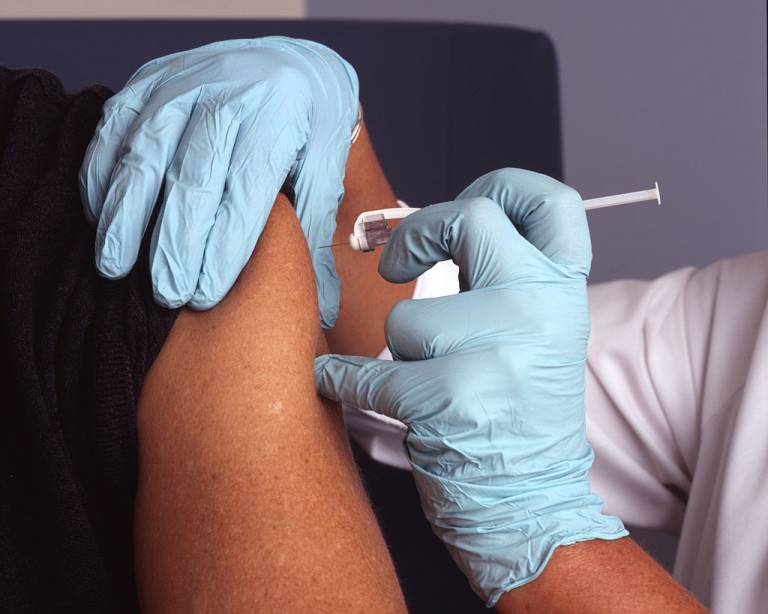UCL supports delivery of potential Covid-19 vaccine
2 June 2020
Scientists at UCL’s Vax-Hub have been working with Oxford University to provide the research base for a Covid-19 vaccine that is now being trialled at University College London Hospitals (UCLH) with support from UCL researchers.

This story was originally published by UCL News on 1 June 2020.
A team led by Professor Martina Micheletti (UCL Biochemical Engineering) collaborated with the Jenner Institute at Oxford on the adenovirus vector manufacturing platform that the Oxford team adapted and developed into a potential vaccine for Covid-19. The UCL and Oxford teams together form the Vax-Hub, a body funded by the Department of Health and Social Care and managed by EPSRC, which focuses on research and manufacturing insight into different vaccine technologies aimed at combatting infectious diseases in low and middle income countries.
Screening for the ‘phase III’ trial of the vaccine began at the end of May, and researchers plan to begin vaccinations in 500 healthy UCLH staff volunteers in June.
Scientists working within Vax-Hub are planning studies to further optimise the adenovirus platform, while reducing cost and complexity, ensuring it is suitable for manufacturers in low and middle income countries.
Professor Micheletti said: “We are very pleased with the Vax-Hub’s role in supporting the Jenner Institute and the Clinical Biomanufacturing Facility in Oxford during the initial phases of development of a potential vaccine for Covid-19. The Vax-Hub expertise and research in vaccine manufacturing insight is unique and we are committed to working with and supporting our partners around the world in addressing epidemic threats.”
Recruitment for the trial at UCLH will focus on healthcare workers who have had a higher chance of exposure to the SARS-CoV-2 virus. This includes, for example, clinical staff in intensive care, A&E and Covid-19 wards, as well as non-clinical staff working in Covid-19 wards such as hospital porters and cleaners.
Professor Vincenzo Libri, Director of the National Institute for Health Research UCLH Clinical Research Facility, will lead the study at UCLH. The NIHR UCLH/UCL Biomedical Research Centre is supporting delivery of the trial, which was set up by the UCLH/UCL Joint Research Office.
Participants will be randomised to receive one or two doses of either the ChAdOx1 nCoV-19 vaccine developed by Oxford or a licensed vaccine (MenACWY) that will be used as a ‘control’ for comparison.
The study will assess if healthy people can be protected from Covid-19 with this new vaccine, and provide valuable information on safety aspects of the vaccine and its ability to generate good immune responses against the virus.
At regular intervals after vaccination researchers will carry out blood tests and collect information about any symptoms that occur. Biological samples will be analysed at the Francis Crick Institute and Health Services Laboratories.
Professor Libri said: “We are excited to begin our portion of this trial at UCLH as we urgently need a vaccine – both to combat the current pandemic and to prevent future outbreaks. We hope we are able to demonstrate that this vaccine can protect against the coronavirus. I want to say a huge thank you to the incredible taskforce whose exemplary dedication has allowed the set-up of this study at record speed.”
UCLH Chief Executive Professor Marcel Levi said: “I am proud that we at UCLH are involved in this study and I thank all colleagues who are contributing to our efforts – either by running the trial or by taking part in it.”
UCLH Director of Research and Chair of Medicine at UCL Professor Bryan Williams said: “Our Biomedical Research Centre is coordinating over 40 important studies of Covid-19 at UCLH but the development of an effective vaccine is a key study as it offers the best hope of beating this disease and we are delighted to be contributing to this hugely important national effort.”
The first phase of the nationwide trial in adult volunteers began in Oxford in April. So far more than 1,000 immunisations have been completed, and follow up is ongoing.
In this ‘phase III’ trial, up to 10,260 adults and children will be recruited at research centres across the UK, to see how the vaccine works in a larger number of people.
Links
- Vax-Hub
- Professor Martina Micheletti’s academic profile
- UCL Biochemical Engineering
- UCL Engineering
- Dr Vincenzo Libri’s academic profile
- UCL Queen Square Institute of Neurology
- NIHR UCLH/UCL Biomedical Research Centre
- UCLH/UCL Joint Research Office
- Professor Bryan Williams’s academic profile
- UCL Medical Sciences
- UCLH
Image
- A nurse administers a vaccine. Credit: Rhoda Baer / National Institutes of Health / Wikimedia Commons.
Media contact
Mark Greaves
Tel: +44 (0)7539 410 389
Email: m.greaves [at] ucl.ac.uk
 Close
Close

